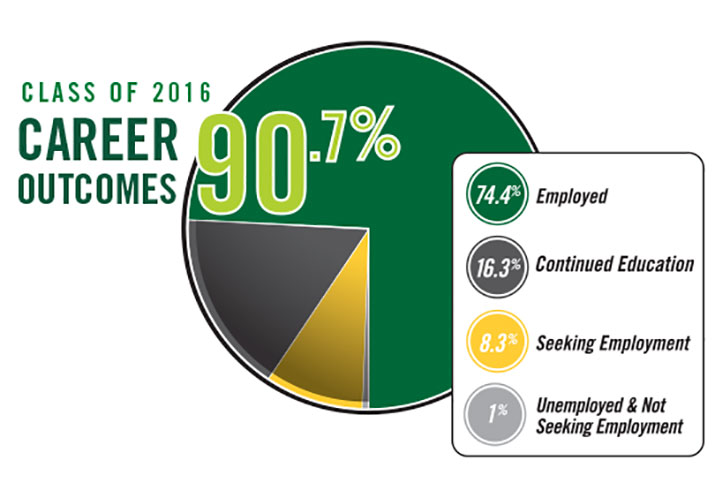Career outcomes rate increases at DelVal

Credit: Delaware Valley University. Delaware Valley University surveyed members of the Class of 2016 and found that 90.7 percent of the survey respondents indicated a career outcome of either employment, continued education, service work or military service within a year of graduating. The survey for the Class of 2016 included students who graduated in August 2015, December 2015 and May 2016. Statistics are derived from a total knowledge base of 78.8 percent of the total undergraduate class of 397 students.
Elizabeth Taylor ’16 has her “dream job.” The English and secondary education major had two job offers within a year of graduating but chose to teach in Central Bucks School District. Taylor is part of the first class to go through Delaware Valley University’s new Experience360 Program, which is designed to go beyond the classroom to prepare well-rounded young professionals. Since launching the program as a graduation requirement with the Class of 2016, DelVal’s career outcomes rate has increased to 90.7 percent.
“From 2015 to 2016, there was a 3 percent increase in the career outcome rate (employment, service work, military service or education), which really showcases the strength of E360,” said Delaware Valley University Director of Experiential Learning Deanna Parkton.
A recent Gallup-Lumina Foundation study found that "while 96 percent of chief academic officers of colleges and universities believe that their institutions are very or somewhat effective at preparing students for the workforce, only 11 percent of business leaders strongly agree."
The Experience360 Program at DelVal is working to change that. DelVal partnered with employers to replace its former requirement of 500 work experience hours with a more robust experiential learning program.
Crafted with input from those employers, E360 is more than just a “work hours” graduation requirement. It’s a full-spectrum approach that helps students gain practical skills and develop as young professionals.
“Not all industries are the same,” said Dr. Benjamin Rusiloski, Delaware Valley University interim vice president for academic affairs. “So, at DelVal we tailor our experiential learning requirements to meet the needs of the specific industries students are entering. DelVal is one of the few universities in the country with an experiential learning program that is customized by major.”
Through the E360 Program, students build their career skills from day one, crafting an action plan that incorporates professional development and problem-based learning. They build confidence, as well as life and leadership skills before entering their careers.
Credit: Delaware Valley University. Francis Arnold ’16, a DelVal business alumnus who was hired by Vanguard.
Experiential learning activities, which include a menu of options ranging from leadership development to study abroad, are reflected on students’ transcripts along with their grades when they graduate.
“These experiences all gave me a grasp of what the real-world entails,” said Francis Arnold ’16, a DelVal business alumnus who was hired by Vanguard.
Employers are finding DelVal graduates to be prepared, professional and productive. In a recent E360 employer survey, 93 percent of employers rated students from the Class of 2016’s work ethic as outstanding or very good.
Students are also crediting the program with helping them clarify their career goals and succeed in executing them. In student surveys, 93 percent of students reported that their critical thinking and problem-solving skills increased as a result of the program.
“This speaks to the incredible power of the E360 program, the institution's commitment to experiential learning, and the services and professional development opportunities DelVal provides,” said Dr. Rusiloski. “We’ve received positive feedback from both students and employers on this innovative new program and we plan to continue to work with employers to develop it. E360 is a leading example of a program that aligns education with the real-world demands of employers.”